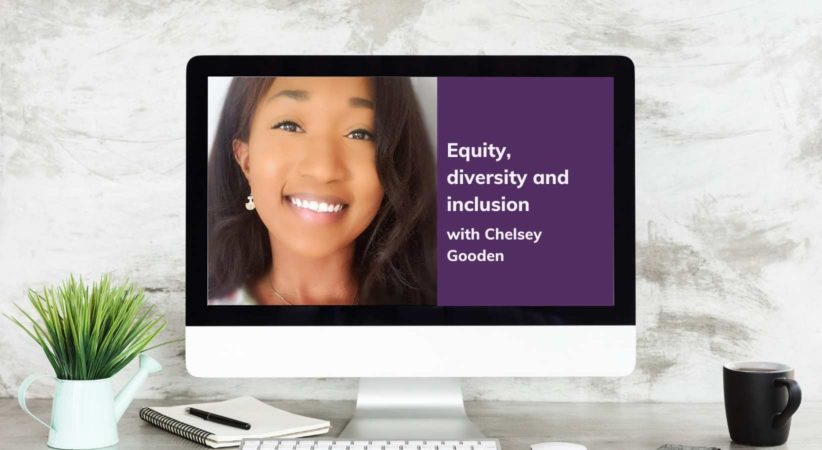
Webinar examines impacts of systemic racism
What is white privilege? What is racism and systemic racism? What are micro-aggressions? Is there racial bias in the media?
Literacy practitioners and Decoda staff considered these questions and more during the powerful Equity, Diversity and Inclusion webinar hosted by Decoda Literacy Solutions on January 19, 2022. Chelsey Gooden, a diversity and inclusion facilitator for education systems, criminal justice systems and health care providers, presented Understanding the Impact of Systemic Racism over Zoom.
The power of storytelling
“This presentation is a storytelling experience, passed from my great-grandparents, to my grandparents, to my parents, to me and now to you. I can’t emphasize enough the importance of storytelling and sharing experiences.”
Chelsey is of Jamaican and Malawian descent. She was born in Toronto, moved to Ottawa at age 10 and now lives in Nelson, BC. She told participants about her own lived experience in Canada as a visible minority with a non-visible disability.
Micro- and macro-aggression
While in Toronto, Chelsey lived in a diverse, multicultural neighbourhood and had lots of friends. In Ottawa, she was in a white community and in a school with a majority of white students.
“I remember my first day of school, the kids crowding around me, wanting to touch my hair and my skin. I felt uncomfortable and overwhelmed.”
Years later, when she excitedly showed up for a new job she had been hired for, the manager looked shocked.
“She said, ‘You’re black! But you sound white, and your name is Chelsey!’”
These are examples of micro-aggressions that are common in society. A micro-aggression is a statement, action or incident regarded as an instance of indirect, subtle, or unintentional discrimination against members of a marginalized group.
Watch the How micro-aggressions are like mosquito bites video for a better understanding of how micro-aggressions impact minorities.
Understanding white privilege and systemic racism
The terms white privilege and systemic racism are often misunderstood. Chelsey explained white privilege as the benefits and unearned advantages given to white people that are denied to and often given at the expense of BIPOC (Black, Indigenous, People of Colour). She described systemic racism in Canada as the normalizing of racism and the societal ideologies and structures that reinforce each other – and disadvantage minorities.
She showed videos that reveal the way media and society use language to perpetuate bias, privilege and systemic racism.
One video highlighted the media coverage of “black protests” versus “white riots” and the different language used to describe participants (like “thugs” versus “young people”).
And perhaps the most powerful and profound moment of the presentation was a video called The Clark Doll Experiment. It had many participants in tears as they watched children attribute positive qualities to a white doll and negative qualities to a black doll – a powerful example of internalized racism in children.
Immerse yourself in diversity
The group worked through a reflective exercise to name their top 10 trusted people and look at their top 10’s gender, race, religion, age, sexual orientation, education and disabilities – and most participants discovered their trusted circle mirrored themselves.
Chelsey encouraged participants to “immerse yourself in diversity. Start consuming content outside your context. Use the internet as a platform to meet new people, see new cultures. You can watch documentaries, read diverse books, follow diverse people on social media. You can take a class and learn something different with a variety of people.”
5 Steps to becoming an ally
Chelsey offered these tips for becoming a BIPOC ally:
- Understand how racism is created and maintained in society.
- Understand your privilege.
- Immerse yourself in diversity.
- Listen, ensure all voices are heard.
- Understand that this is a journey.
“Equal rights for others does not mean less rights for you. It’s not pie.”
Learn more and connect with Chelsey via her email chesleynicolegooden@gmail.com.
Find more professional development opportunities on Decoda’s training page.
Related Blog Posts
Literacy Month raised $45,000 for BC literacy programs
Literacy Month raised $45,000 for BC literacy programs.
Every gift has the power to impact lives
Decoda’s director of fund development builds relationships to support literacy and BC.
Program manager connects to family literacy
Decoda program manager talks about the 2022 Family Literacy Week theme ‘Let’s Connect!’
